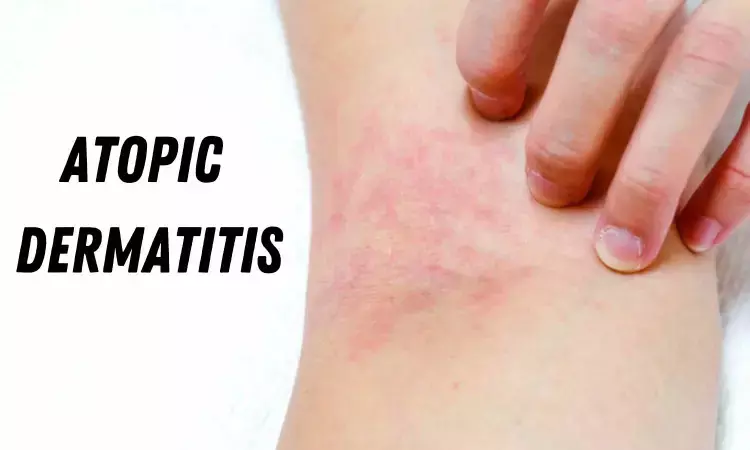- Home
- Medical news & Guidelines
- Anesthesiology
- Cardiology and CTVS
- Critical Care
- Dentistry
- Dermatology
- Diabetes and Endocrinology
- ENT
- Gastroenterology
- Medicine
- Nephrology
- Neurology
- Obstretics-Gynaecology
- Oncology
- Ophthalmology
- Orthopaedics
- Pediatrics-Neonatology
- Psychiatry
- Pulmonology
- Radiology
- Surgery
- Urology
- Laboratory Medicine
- Diet
- Nursing
- Paramedical
- Physiotherapy
- Health news
- Fact Check
- Bone Health Fact Check
- Brain Health Fact Check
- Cancer Related Fact Check
- Child Care Fact Check
- Dental and oral health fact check
- Diabetes and metabolic health fact check
- Diet and Nutrition Fact Check
- Eye and ENT Care Fact Check
- Fitness fact check
- Gut health fact check
- Heart health fact check
- Kidney health fact check
- Medical education fact check
- Men's health fact check
- Respiratory fact check
- Skin and hair care fact check
- Vaccine and Immunization fact check
- Women's health fact check
- AYUSH
- State News
- Andaman and Nicobar Islands
- Andhra Pradesh
- Arunachal Pradesh
- Assam
- Bihar
- Chandigarh
- Chattisgarh
- Dadra and Nagar Haveli
- Daman and Diu
- Delhi
- Goa
- Gujarat
- Haryana
- Himachal Pradesh
- Jammu & Kashmir
- Jharkhand
- Karnataka
- Kerala
- Ladakh
- Lakshadweep
- Madhya Pradesh
- Maharashtra
- Manipur
- Meghalaya
- Mizoram
- Nagaland
- Odisha
- Puducherry
- Punjab
- Rajasthan
- Sikkim
- Tamil Nadu
- Telangana
- Tripura
- Uttar Pradesh
- Uttrakhand
- West Bengal
- Medical Education
- Industry
Tralokinumab beneficial for patients with prurigo nodularis-like phenotype atopic dermatitis: JAAD

Italy: Tralokinumab, an IL-13 monoclonal antibody, showed clinical improvement in patients with prurigo nodularis-like phenotype atopic dermatitis refractory to dupilumab, a prospective, multicenter, open-label case series study has revealed. The study was featured in the Journal of the American Academy of Dermatology on May 05, 2023.
Various phenotypes of atopic dermatitis (AD) exist. Nearly one-half of the patients with AD have prurigo nodularis (PN). The chronic itch usually results in an itch-scratch cycle with secondary lesions development in all AD phenotypes. These include, in the PN-like phenotype, excoriated hyperkeratotic, intensely itchy papules and nodules in areas accessible to scratch.
An emergent role has been suggested of the type 2 cytokines, including interleukin (IL) 4, IL-5, IL-31, and IL-13, in the pathogenesis underlying AD itch. IL-13 is a potent enhancer of the neuronal response to different itch stimuli. Tralokinumab is a novel treatment that has demonstrated efficacy and safety in clinical trials treating adult patients with moderate-to-severe AD. Tralokinumab is a fully human IgG4 monoclonal antibody neutralizing IL-13.
Elena Pezzolo, Department of Dermatology, San Bortolo Hospital, Vicenza, Italy, and colleagues had reported that tralokinumab improved clinical manifestations in two patients presenting with PN-like phenotype. Therefore, they prospectively investigated the safety and efficacy of treating for at least 16 weeks. The study included 17 adult patients with moderate-to-severe PN-like phenotype AD at five dermatology tertiary referral centres from July 2021 to November 2022.
Patients were eligible for tralokinumab treatment after failing the first-line approved biologic treatment dupilumab without achieving EASI (eczema area and severity index-50) after treatment for 16 weeks. For each patient, the authors obtained written informed consent.
At baseline, patients (mean age 60.75 years; 76.5% women) presented moderate-to-severe PN-like phenotype atopic dermatitis with means EASI of 27.2, numeric rating scale (NRS)-itch of 9.8, Investigator Global Assessment (IGA) of 3.7, dermatology life and quality index (DLQI) of 16.3, and NRS-sleeplessness of 8.9. At baseline, seventy percent of patients used concomitant topical corticosteroids.
The authors reported the following findings:
- Patients reached EASI-50 within four weeks, EASI-75 within 12 weeks, and EASI-90 within 32 weeks (mean EASI reduction from 27.2-1.7).
- The mean NRS-itch, sleeplessness, and DLQI values significantly decreased as early as week four and progressively reduced after 16-week continuous treatment.
- Tralokinumab resulted in complete or almost complete clinical remission (IGA 0 or 1) in 76% of patients, 47% within week 12, 23% within week 32, and 6% within week 64, and an at least 2-grade IGA reduction in others (24%).
- Both patients with 16 weeks of treatment observation (8/17) and 32 or 64 weeks of continuous treatment (9/17) maintained clinical efficacy without reporting any serious adverse effects.
- Mild conjunctivitis represented the main adverse effect (12%), followed by injection-site reaction, localized urticaria, and mild herpetic stomatitis.
"Our findings showed that tralokinumab effectively treated patients with prurigo nodularis–like phenotype of atopic dermatitis refractory to dupilumab," the researchers concluded.
Reference:
Pezzolo E, Gambardella A, Guanti M, Bianchelli T, Bertoldi A, Giacchetti A, Donini M, Argenziano G, Naldi L. Tralokinumab shows clinical improvement in patients with prurigo nodularis-like phenotype atopic dermatitis: A multicenter, prospective, open-label case series study. J Am Acad Dermatol. 2023 May 5:S0190-9622(23)00760-0. doi: 10.1016/j.jaad.2023.04.056. Epub ahead of print. PMID: 37150301.
Dr Kamal Kant Kohli-MBBS, DTCD- a chest specialist with more than 30 years of practice and a flair for writing clinical articles, Dr Kamal Kant Kohli joined Medical Dialogues as a Chief Editor of Medical News. Besides writing articles, as an editor, he proofreads and verifies all the medical content published on Medical Dialogues including those coming from journals, studies,medical conferences,guidelines etc. Email: drkohli@medicaldialogues.in. Contact no. 011-43720751


